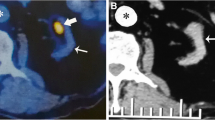Abstract.
Post-transplantation lymphoproliferative disorders (PTLD) are a complication of immunosuppressed transplant recipients, and their incidence is reported to be 20–120 times greater than the rate in the general population. After kidney transplantation, PTLD more likely arise within the renal transplant fossa. Radiological patterns of these forms are presented and discussed, according to a review of the literature, and illustrated by cases from our institution. Ultrasound plays an essential role in the early diagnosis of PTLD by detecting a urinary obstruction associated with adenopathy or an ill-defined mass not previously seen. However, in the case of an inconclusive US examination, CT or MRI should be performed to confirm the presence of a mass. Both techniques are useful in evaluating the extension of the process within the transplantation fossa; MRI seems more accurate and can be used for the follow-up, especially after reduction in immunosuppressive therapy without transplant removal.
Similar content being viewed by others
Author information
Authors and Affiliations
Additional information
Received 8 October 1997; Revision received 17 March 1998; Accepted 23 March 1998
Rights and permissions
About this article
Cite this article
Claudon, M., Kessler, M., Champigneulle, J. et al. Lymphoproliferative disorders after renal transplantation: role of medical imaging. Eur Radiol 8, 1686–1693 (1998). https://doi.org/10.1007/s003300050614
Issue Date:
DOI: https://doi.org/10.1007/s003300050614




